Crapshoot: Conquests of the Longbow, the Robin Hood game that didn't suck
We're rerunning Richard Cobbett's classic Crapshoot column, in which he rolled the dice and took a chance on obscure games—both good and bad.
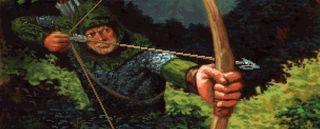
From 2010 to 2014 Richard Cobbett wrote Crapshoot, a column about rolling the dice to bring random obscure games back into the light. This week, Robin Hood could be in a fix. Robin Hood, Robin Hood, spies a Weetabix. Does he retreat? Back to Sherwood? No. Because it's just a ****ing cereal.
Today I want to talk a bit about one of my favourite game endings of all time. Of course, to get there and see why it's so great, we need to take a little bit of a journey. The place? Sherwood Forest. The time? How about right now, or in a few hours if you're reading this in Americaland? And the hero of the quest? A man in Lincoln green tights by the name of Robin Hood. You may have heard of him.
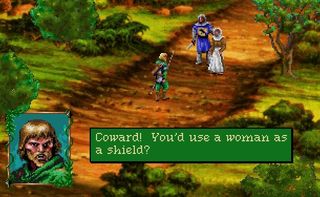
Conquests of the Longbow is one of Sierra's lesser-sung adventures—most of which also hit the shelves without the word "Quest" or "Larry" anywhere in their titles. It was the sequel to an Arthurian game called Conquests of Camelot, with both games written by designer Christy Marx (who has plenty of credits, gaming and otherwise, but whose most famous creation is probably Jem—the 80s pop cartoon whose theme music is even now almost certainly running through your skull. Um. Sorry about that.)
Both games took a similar approach to their myths: meticulous detail, and a more paganistic version of the stories than usually told. In Camelot for instance, Arthur has to begin his quest for the Holy Grail by paying tribute to both Christ and Mithras, an ancient mystery cult.
Amusingly, the penalty for ignoring either was the same, and this was a Sierra adventure with many Sierra deaths, making this the only game I'm aware of where a vengeful Christ will drop a portcullis on your head for disrespecting him.
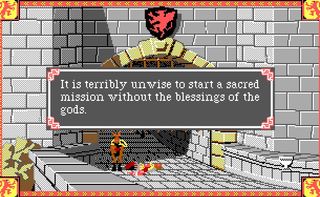
The beauty of both legends is that they're endlessly malleable. Neither have a 'true' version, and changed radically over the years. In the Arthurian stories, specific retellings like Mallory fixed our view of the story, but elements like Guinevere's affair with Lancelot, or even Lancelot's existence—in earlier versions, Gawain was firmly The Man—were late additions to the story. Personally, I always felt a little sorry for Morganna le Fay, who started off as an ally but eventually morphed into one of the villains, probably because her name is much, much cooler than that of her sister Morgeuse, which sounds like something a hungry man would shout at a duck-themed banquet.
The legends are still being written today. In the case of Robin Hood for instance, it's now expected that the Merry Men—though that term is increasingly sidelined for obvious reasons—will contain a Saracen member. The most famous of them is Morgan Freeman's Azeem from Robin Hood: Prince of Thieves, with the BBC going for a twofer by making it a woman called Djaq. This trend only goes back to the 1980s though, and specifically a character called Nasir in Robin of Sherwood.
Comic deals, prizes and latest news
Sign up to get the best content of the week, and great gaming deals, as picked by the editors.
Like all the best myths, the origins of Robin Hood are largely lost in time. The version of the story we all know now has little in common with earlier versions, where he's been everything from a yeoman to a nickname, to an early marketing campaign. Among the most obvious changes is that originally he didn't wear green, but red. Another is that in these early days, Maid Marian was nowhere to be seen—she entered the story through a side entrance, first as another character played during festivals, and then as a way of making the rough outlaw more of a Gentleman... and, it's been suggested, to perhaps draw attention away from talk of the Merry Men being just a little too Merry. IfyouknowwhatImean.

The accepted modern version though is pretty straightforward. Robin is an aristocrat who sees the plight of the poor while good King Richard the Lionheart fights the Crusades and evil Prince John rules the country with an iron fist. Stripped of his land and title, he turns his skills with the bow to justice, robbing from the rich, giving to the poor, and tangling with the cruel Sheriff of Nottingham.
(In reality of course, King Richard—despite having a mighty name and good popularity—was a monumental tool who couldn't have given half a dung-beetle's buttock for England, did his best to avoid the place, and ultimately retired in France. As for Prince John... well, he was a bad king, often a cruel man, and staggeringly unpopular, but it's notable that most retellings of the Robin Hood story avoid the unfortunate fact that Richard later forgives him and he ends up being the king who, deeply reluctantly and under duress, signs the Magna Carta into law.)
Conquests of the Longbow uses this version relatively straight, its main deviations from the norm being that Marian is a pagan forest priestess, and that magic exists in a couple of forms. It's far from an omnipresent thing though, and something that few of the characters are even aware of.
The story is set at a very specific time during the legend, with Richard captured by King Leopold of Austria and held for ransom. This actually happened, and caused no shortage of political trouble—not least that while Richard's mother, Eleanor of Aquitaine, desperately tried to raise the cash, John tried slipping Leopold a few treasure chests to hold onto him for a bit longer. As Robin Hood, it's your job to foil any attempts to stop the ransom being paid, and contribute to the fund wherever you can. If you play the multiplayer, the amount you raise can be doubled wait sorry, wrong game and also millennium.

I really like Conquests of the Longbow. It's a relatively simple adventure in many ways, not very long or difficult, and with half the puzzles consisting of wandering onto Watling Street and waiting for a convenient person to wander down it with something you need, and the other half consisting mostly of looking in the manual for copy-protection questions. Shields, hand-codes, the meanings of gems... it's ridiculous, and really gets tiring by the end.
What it lacks in raw puzzles though, it makes up for with its style and storytelling. Death sequences for instance don't simply give you the classic Sierra "You screwed up, you idiot. Buy a hint book?" prompt, but offer a cut-scene of the Merry Men commiserating your death or simply trying to work out why their beloved leader would have done something so stupid as to walk right up to Nottingham Castle without bothering with a disguise. Scenes like this help compensate for the fact that they barely actually do anything in the game, while still conveying the feel that you're a leader of men instead of a jealous-looking Batman. In short, its triumph is simply described—that it does a great job of putting everything you'd want in a Robin Hood adventure into one, from the shooting contest to a bit of romance, to repeatedly humiliating the Sheriff in his home territory,
(Fun fact, there is still a Sheriff of Nottingham. Being evil isn't a prerequisite as far as I know. Interestingly, he wasn't always a villain or even particularly important in the myths themselves. The same goes for Robin's other nemesis, Guy of Gisbourne, who was originally an actually criminal outlaw, with his role in the stories likely at least in part to reinforce that there was nothing inherently noble about being one. Guy isn't in this one though, leathered up and brooding or not.)

The main story is broken into 13 individual days, each with their own key problem. The first is simply about getting to know the characters and slipping into Robin's skin. It's quiet, with the gang squabbling light-heartedly about Tuck eating all the pies... fish, deer, meat and parts of the table... Robin practicing the archery mini-game that will clearly be used by the end of the week, and generally admiring the lush VGA scenery. It looks about as much like Sherwood Forest as Bognor Regis, but still lovely. In this version, Robin lives in a cave next to a clearing, where the Merry Men haven't exactly outdone themselves in stealthiness by building giant picnic tables by the river. Nottingham is a short hike away, with a map for instant teleportation, though best avoided. Other areas are likewise marked so that you can go and take a look, but you won't be visiting them just yet.
Wandering around, Robin bumps into a Widow in the woods who helps the outlaws, and whose sons are carefully warned not to get themselves caught by the Sheriff—something that obviously will never, ever happen in exactly five days time. Aside from setting up that plot point though, there's little to do.

Watling Street is the main road leading into Nottingham, and where the outlaws launch their ambushes on incoming travellers. Today's lucky winner of some Sherwood hospitality is one of the Sheriff's men chasing after a peasant woman. He claims she hasn't paid her taxes. She claims they've been collected three times in one week. He sniffs and says he doesn't keep track, but figures a little rape will fix everything right up. Clearly, a lovely guy and a true discredit to his employer. Congratulations!
Like many situations in the game, this can be dealt with in a number of ways. Robin can simply pull out his bow and shoot him. He can blow his horn to summon his men to help... though this ends up being pointless, as the foul wretch threatens to kill the woman if they don't leave. He can move to attack the man, resulting in her death. He can simply walk away, hoping no troubadours were present. He can stand and have a staring contest with the guard instead of actually doing anything. He can also try to take the guard on in hand-to-hand, which... well... doesn't work out very well for the hostage.
Whatever happens, the game continues. I'm sure there will be no later repercussions. If you really want to be nice, you can even give the woman some money to help her on her way... though the game doesn't actually pay any attention to how much you give, meaning that everyone swoons at you for throwing them the equivalent of a penny. You generous soul, you.
The only other thing to do on Day 1 is practice the archery mini-game archery. If you turn the game's Arcade difficulty down to the bottom, you don't actually have to. In fact, you can't. Robin dismisses the very idea of practice with "Sooth, I've no need for practice. One cannot improve upon perfection," which in my view makes him such a prick that he could probably punch his face through tungsten. Otherwise though, it's important to practice. This is a game about Robin Hood. What are the odds you won't end up in an archery contest at some point? Exactly none, that's what.

The day ends like they all do, with the gang getting together for supper to talk about the events of the day. Robin isn't exactly heroic in this, immediately lowering the tone by pointing out how much it sucks to be outlaws and facing danger every day, before getting to the bottom of his mug of ale and simply admitting that he's sick of nocking his arrow in his cave all the time and really wants a woman. Then he collapses unconscious in a drunken stupor. Hero of the People!
As he sleeps though, he dreams of a beautiful woman in white dancing through the trees and the wind whispering "Marian". Not his own wind, obviously. That only ever whispers "Parp." As he approaches, she disappears, leaving behind a glittering green stone—half of an ornately carved heart. Then he wakes up and his pillow is gone. Also, he's still holding it in his hand. The stone, I mean. Obviously.
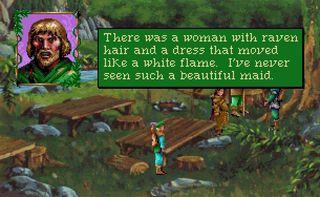
Day 2 sees Robin infected with the Luck Virus from Red Dwarf. One of the problems with Conquests of the Longbow is that it's staggeringly contrived at times, and never more so than here. As soon as he leaves the cave to show off his new emerald, resulting in Friar Tuck delivering the 12th century equivalent of "Holy shit!" ("By my troth!") but the others amusingly indifferent to their leader almost literally pulling gemstones out of his arse, he's told that a cobbler in town has news of King Richard and needs to speak with him. However, there's a catch. The cobbler, Lobb, will only speak to him if he brings a lady's slipper as proof of his identity. Where does he find a lady's slipper?
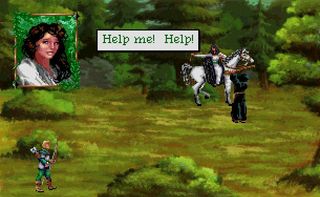
(Personally, I suspect Lobb was hoping he'd come to the shop and buy one.)
That five minutes worth of work exhausting him beyond reason, Robin promptly calls it a day. Luckily, the Luck Virus is still in effect the next morning when he decides it's time to get off his arse and go see Lobb. He needs a disguise. But where to get one? As ever, Watling Street provides.

This time, it's a beggar. Robin intercepts him, figuring that his rags will make for the perfect disguise to slip into town unnoticed. Again, he's got a couple of options. For starters, there's his bow. Drawing an arrow, he can order the wretch to strip to his undershirt and hand over his rags, before calling his men to escort him in the other direction. Alternatively, since that's not exactly heroic, he can buy them off him... for a quarter of a single coin... before summoning the Merry Men to take him for dinner at their camp, give him an extra purse of money to compensate for cheapskate players, and kit him out with a new outlaw outfit that definitely won't get him murdered by any guards who happen to see him.
Lobb turns out to be a loyal servant of the Queen, as is Marian. He fills Robin in on the latest on the ransom, which is that Queen Eleanor is struggling to raise the ransom, and John has diverted half its amount to the Abbot of the local monastery. He needs Robin to intercept it before it arrives and capture it, and Robin of course accepts... not least because it'll mean the chance to see more of Marian.
All of her, if he plays his cards right.

The next day is pretty quiet. This time, Watling Street coughs up a poacher. Not a lot of interest in this encounter, except for the way that if you summon your men to help you deal with him, Robin ends up dismissing them immediately on the grounds that this wouldn't be a fair fight. As if anyone is likely to know. One arrow and quarter of a silver penny later, his Cheap But Good Deed Of The Day is done.
Which means it's time to go in search of love! Marian meets him at the sacred grove he dreamed of, and reveals that she has the second half of the gemstone heart—hers being diamond. They immediately pledge themselves to each other on the grounds that it beats waiting for OKCupid to be invented, though Marian virtuously makes it clear that she can't possibly be the quiver for his arrow until King Richard is safe. Or even give him a quick peck on the cheek for luck.
More practically, she assigns him to steal a mysterious scroll from the monastery in the spooky, haunted fens that Nottingham definitely, absolutely has. They're not actually monks though, just a group of soldiers loyal to John who are acting as his cloak-and-dagger operatives, so killing them is a public service rather than a fast-track to the bowels of Hell. Robin seems relieved by this.

Before he can head down there though, something totally unexpected happens—the Widow's sons are arrested by the Sheriff. This leads into the first full day of work, with Robin stealing an outfit and sneaking them out through a secret passage between the jail and the local abbey. There are lots of steps to this, like a drinking contest with the local Abbot, and a funny sequence where Robin in a monk's habit bumps into the Sheriff and ends up giving him a sarcastic blessing in front of his men ("May you get all you deserve, and may I live to see it."), but nothing worth going into in great depth save that he ends up with one of the Abbott's treasures—a puzzle box containing a magic ring. Unfortunately, you can't crack it open and play with it just yet. Soon though. Very, very soon...
(This bit also contains by far the hardest part of the game. It's a round of Nine Men's Morris to win a not-so-truly-truly-outrageous gem with the power to keep you sober. This is spectacularly tricky. Thankfully, the AI responds the same way every time, so you can just find a list of moves that beat it.)

That dealt with, the next day takes a somewhat darker turn in the Swamp of Copy Protection. Uh. I mean, the Nottingham fens. The Black Monks do not mess around, and the one who inevitably shows up on Watling Street to donate his clothes to the cause and...
...you know, now I think about it, Robin spends a lot of time in this game either killing/threatening/bribing people for their clothes or sending them off in various degrees of nakedness, doesn't he?
Anyway, Robin can simply shoot him, but the Monk invokes Section A, Subsection B of the Hero Code—the "What are you, chicken?" clause that suggests they fight like men, in a rap battle. Specifically, rapping each others' skulls with quarterstaffs. It's another arcade sequence if you have them turned on, an instant victory if not, and a new change of clothes either way. As long as you win.
At the fens, Robin gets a ride across the water in a boat steered by a sullen monk. On the other side, his identical twin challenges him to a battle of wits... or to be more exact...

I really, really dislike this kind of copy protection. It's boring in this case because you not only have to answer the riddles, but ultimately select nine stones to prove you bought the game/own a photocopier. Worse though, there is absolutely no reason for Robin to know the meanings of these stones, unlike the Druid Code that comes later. It's out of context, and out of context things are this: bad.
But anyway.
The Black Monks are up to spectacular amounts of No Good in their castle, including torturing a prisoner, holding secret information, and being led by a man with a goatee. That's how you know he's Evil. The prisoner turns out to be an important one though by the name of Fulk—the Queen's jester. In return, and pausing only to go grab the scroll that Marian needed, he's given an incredibly important artefact for his service—The Ring That Commands Water—and the clues needed to open the puzzle box containing The Ring That Commands Fire. Sadly, no sign of The Ring That Kicked The Hornet's Nest.

Next day, it's time for... you guessed it... more copy protection! This time it involves a druidic code that you only get to see for about two seconds, based on assigning letters to different parts of the hand and tapping them. These days, you can grab a screenshot. At the time, you had to be really, really fast at writing it down or just use the manual. Sigh. This is immediately followed by a warning of the next test—that you'll have to track down a specific coat of arms at Nottingham Fair, but are only told the name of it. Where do you get to see it so that you know what you're looking for? Guess. If this was Fawlty Towers, it'd be getting a clip round the ear for being irritating and obstructive for no good reason.
On the plus side, the Fair means it's time for the bit everyone's been waiting for!
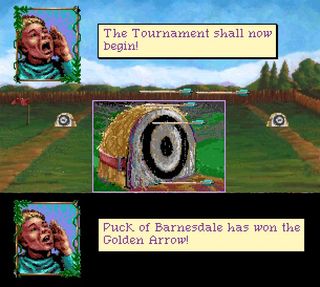
Hope that was worth it.
Winning the tournament, and with it, the Sheriff's prized golden arrow, turns out to be a Pyrrhic victory however, as Robin wakes to find guards rampaging through the forest. Luckily, he has the power of Copy Protection Magic on his side, and can use it to talk to the trees for protection and oh god, how many manual lookup puzzles does one game need? I do like this game, honest I do, but it's about this point that it really starts taking the piss with a catheter. Attached to a hosepipe.
Escaping the patrols, it's over to Watling Street once again. Today's visitor is what appears to be a poor tradesman who turns out to be hiding a bag full of jewels which turn out to be fake—part of an attempt to scam the Sheriff's wife. Robin liberates him of his clothes... again... and heads off to do the same. With the help of some rouge, nobody recognises him as the archer from yesterday.
Not content with simply bilking the two nobles out of their money though, he takes things a step further, claiming to have discovered a cave full of jewels left behind by none other than Merlin himself. The Sheriff is soon convinced, and agrees to both load a horse with thousands of coins to buy its location, and head alone into the forest with his new friend to avoid the guards discovering its location.
...
This goes about as well for him as you'd expect.

Next day though, things get serious. Marian is captured while trying to deliver a message to the Queen's messenger, and sentenced to be burned to death in the Abbey. A plan is quickly formed—or rather, several are, ranging from an all-out assault to a sneaky-sneaky infiltration. With a sneaky plan, and a little help from the Ring That Commands Fire though, the day is soon saved and Marion rescued. Mostly. As she dies of smoke inhalation in her beloved grove, Robin realises that the power of their heartstone gems can deus ex machina the shit out of this and brings her back from the brink.
...or he doesn't and she actually dies. Which sucks for everyone concerned.

For the final couple of days, it's full steam ahead on the plot—the discovery of a fake knight pretending to be in the service of the king, an assault on the money being delivered to the Abbey, and a return to the Fens to rescue the man who can get it to its destination. All that happens pretty quickly though, and then it's time for Robin to play the waiting game. It's a long, cold few months... though at least he does finally talk someone out of their clothes for reasons other than wanting to wear them around town...

But I mentioned at the start that what I really wanted to talk about was the ending.
This takes place a few months after sending the ransom. Robin's luck finally runs out and he gets captured by the Sheriff, who wastes no time sending him to the gallows. But. As he stands on the steps, preparing to join Manny Calavera in the land of dead heroes, a miracle happens—a clash of steel, the sound of hooves on stone. At the last possible second, the King has returned.
"Word came to me, Master Sheriff, that you'd captured the great outlaw Robin Hood," he announces. "But I heard nothing of a trial! Is this the way you've kept the law in my absence?"
And so it begins.

"Robin Hood, you and those you call your men stand accused of brigandage..." begins the king, as Conquests of the Longbow goes back over every single decision you've made to answer the ultimate question—were you really playing as an honourable outlaw, or just an egotistical thug. Until this point, nobody (but victims) have even sniffed at you just levelling a bow at every problem.
Now, it becomes relevant—as it so obviously should be.

This is brilliant, brilliant design, and not just for its era. Very few games have tried to weave the moral choices into something of this complexity, and even fewer have done it so well. Bioshock 2 for instance pulled a similar trick of judging in the late-game, also through the eyes of an impartial observer. In that case, the question was how well you'd taught your adopted daughter to handle the world, and whether she'd become cold and brutal or honourable and forgiving as a result. Mass Effect 3... also exists, and I'm insanely bored of talking about that one now, so let's just pretend we did and move on, okay?
In this case, you can probably guess the endings. In the best, Robin is restored and made an Earl, along with being given permission to make Marian a maid no more. In the worst... admittedly, next to impossible to get without trying... ending, things don't go quite so well.
Check this video to see the variation points. And remember, this was 1992. Games did have multiple endings at this point, but something of this degree was still a rarity. Still is.
There's lots to like about Conquests of the Longbow beyond this though. Its copy protection is ghastly, and you can easily pick holes in the design being repetitive and occasionally silly. It nails its setting though, with buckets of details and fun character touches, and above all, it does a great job of putting you into both the shoes and world-view of history's most infamous fictional outlaw. I liked when I first played it. I like it now. It may not be Sierra's best, but it deserves more credit than it usually gets.
There. See? I can be nice.
Next week, something a little less nostalgic.
Most Popular


